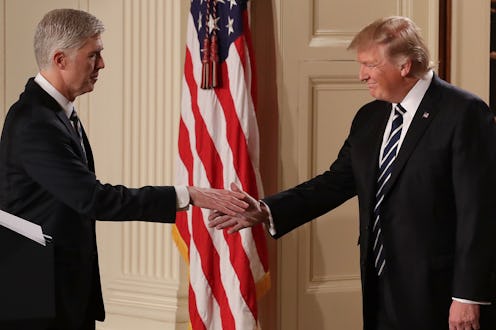News
Gorsuch's Immigration Views Are Hard To Determine

Neil Gorsuch, an appellate court judge with a Harvard law degree, is President Trump's pick to fill Antonin Scalia's vacant seat on the Supreme Court bench. The announcement from Trump came on Tuesday, as he introduced Gorsuch and his wife to a room full of lawmakers. Given the ongoing protests happening far outside that room, though, Gorsuch's views on immigration are likely to become of the utmost importance.
Those protests have stemmed from the various executive orders signed by Trump over the past week. First, there was his directive to build the long-promised border wall — for which he claimed Mexico would pay. Then, there was the controversial, so-called temporary "travel ban." Signed on Friday, the ban prohibits individuals from seven predominantly Muslim countries, including Syria, from entering the United States for 120 days until a new system of vetting can be solidified.
Needless to say, the executive orders have sparked widespread demonstrations across the country. Airports were filled with protestors and immigration lawyers over the weekend, and protests were also planned for the week ahead. If the past week is any indication, then immigration is sure to be a hot-button issue throughout Trump's presidency, and the Supreme Court will need to be on high alert.
That's where soon-to-be Associate Justice Gorsuch (if he's confirmed) comes in. Gorsuch's specific views on immigration remain unclear, but he's known to judge with a conservative mindset, which could suggest favorable outcomes for the Trump administration. Surely, it's not that simple though.
Across the spectrum of issues he has dealt with, Gorsuch seems interested in limiting the power of the federal government. This is typical of conservatives, who often favor empowering states more so than the federal government. As Fox Business sees it, Gorsuch's affinity for small government could come into direct conflict with Trump's own affinity for executive orders.
So far, Trump's immigration policy has been dictated in executive orders. According to the Constitution (and your fourth-grade civics textbook), however, it's Congress that is supposed to make laws, not the president. If Trump's executive orders are challenged in the Supreme Court, Gorsuch would likely side with the Constitution. After all, he is widely seen as a continuation of Scalia's legacy, which prioritized a strict interpretation of the Founding Fathers' words.
It's important to note that several things must occur before Gorsuch ever hears a Supreme Court case about Trump's travel ban. First, Gorsuch will have to be confirmed by the Senate. Additionally, a court case challenging the travel ban must make it all the way to the high court. Finally, SCOTUS — with Gorsuch — would have to accept the case. There's a long road ahead, but the clamor from protestors seems to be paving it as quickly as possible.